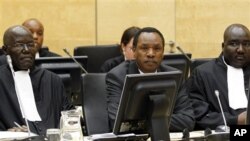The trials against suspects in Kenya’s post-election violence have yet to begin at the International Criminal Court but the issue of witness intimidation has once again been raised.
Kenyan MP Henry Kosgey, MP and Presidential hopeful William Ruto and radio host Joshua Sang stand accused of planning and organizing the 2007 post-election chaos that left over 1,300 dead and some 300,000 displaced. The actual trials have yet to begin and, if approved, are not likely to begin until the end of the year. But there is already a cloud hanging over the proceedings with fresh allegations of witness intimidation being leveled at the defendants in court.
On Thursday, during initial hearings to confirm the charges, ICC Victims Representative Sureta Chana accused Kenyan MP Charles Keter of threatening witnesses testifying against the three suspects during a radio station call-in program. Keter allegedly claimed to know the identities of two of the witnesses whose testimony was presented during the hearings.
“Mr. Keter went on to warn that the confirmation of charges would be over by Wednesday or Thursday and that ‘these people will face unspecified consequences,'" said Chana.
Keter is one of many Kenyan politicians who has travelled to The Hague to support Ruto, Kosgey and Sang during the court proceedings. The call allegedly placed by Keter was made to Kass-FM, a radio station based in Kenya’s Rift Valley - an election violence hotspot. Kass-FM is the same station through which defendant Joshua Sang allegedly broadcast instructions and updates to the perpetrators of the post-election violence.
But like much of the accusations leveled at the defendants so far, the truth is difficult to verify. Representatives of the defendants have accused the prosecution of basing most of its case on hearsay and biased reports and ICC Prosecutor Luis Moreno-Ocampo has been criticized for refusing to reveal his sources. Keter for his part has denied the allegations against him, and representatives from Kass-FM could not be reached for verification of the remarks.
The issue of witness intimidation has been perhaps the most contentious issue in the two cases against the six Kenyan suspects facing charges at The Hague. Accusations and fears of coercion have been a constant theme in the year and a half since the ICC investigations began.
Kenya tried unsuccessfully to stop the proceedings in The Hague through the establishment of its own national proceedings, filing appeals to the ICC and even requesting a deferral from the United Nation’s Security Council. But observers say the lack of a substantive witness protection system in the country is one of the major impediments to credible national trials.
Numerous cases of witness intimidation have been reported by the Kenyan media and the Kenya National Commission on Human Rights revealed that several witnesses had reported cases of intimidation to their team during the ICC investigations. The fear was so great that ICC prosecutor Luis Moreno-Ocampo requested the Kenyan Government to remove head of civil service Francis Muthaura for fear that his influence over the country’s police could lead to witness coercion. Muthaura is a defendant in the second ICC case regarding Kenya’s Post-Election violence.
Kenya National Commission on Human Rights chairwoman Florence Simbiri-Jaoko says the spate of cases of intimidation led the court to issue specific restrictions to the suspects in order to prevent arrest warrants from being issued.
“The suspects were given very clear directives on engagement," said Simbiri-Jaoko. "They were told they were not supposed to intimidate witnesses. They were told how to engage even amongst themselves. As it is now, the ICC is in charge of its witnesses.”
While the defendants have much to lose engaging in such practices, the accusations leveled at MP Charles Keter raise complicated questions. Keter is closely allied with three of the politicians currently facing charges at the court, but he is not himself a defendant.
Responding to the accusations, Judge Ekaterina Trendafilova simply reminded the suspects of their obligation under the ICC summons to refrain from witness contact or intimidation. She also warned the prosecution team about violating procedure by raising the Keter incident in their closing arguments.
The ICC judges will deliberate whether or not to try the three suspects in the ICC’s full court. Before that decision is made, they will preside over the confirmation of charges hearing for the other three suspects in Kenya’s post-election violence: Deputy Prime Minister Uhuru Kenyatta, head of Civil Service Francis Muthaura and former Police Commissioner Hussein Ali. The hearing is set to begin on September 21.
Witness Intimidation Casts Shadow Over Kenya ICC Cases




